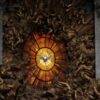Tag: ‘analogy
Barth’s Analogy of the Filioque for His Theology of the Word
Karl Barth, in his Göttingen Dogmatics, takes from neo-Reformed Dutch theologian’s, Herman Bavinck’s notion of Deus dixit (‘God has spoken’), as a way to think about the way God has revealed Himself bound up in a radical doctrine of the Word of God. Many have probably heard of Barth’s threefold form of the Word of God; it is in the early years of his time at Göttingen that this line of thinking got started for him; particularly as he was pressed upon to teach a Reformed dogmatics within a Lutheran setting. The following showcases the way Barth articulated his understanding…
All You Ever Wanted to Know about Barth’s Analogy of Faith
The Deus absconditus (‘hidden God’) is the Deus revelatus (‘revealed God’) in Jesus Christ. But how do we know this? Because Jesus said so; He demonstrated so. A genuine Christian theologian isn’t given to fits of speculation about godness. A genuine Christian theologian is definitionally such simply by the confession that they are Christian. But much of this has gone by the wayside in the development of dogma in the catholic Church. In Latin theology for example, where Thomas Aquinas has been canonized, for both the Catholic and Protestant theologian alike, the method for developing a doctrine of God is…
Calvin in Barth’s Services on an ‘analogy of relation’ against Natural Theology and Her ‘Resourcers’ in scholasticism Reformed
Knowledge of God is the key, that is to the ‘secret of creation.’ If “Jesus Christ is indeed the real ground of creation,”[1] then in order to know what in fact creation is for, we must first know its Creator. But as Karl Barth underscores, in a rather Athanasian key, if Jesus is the ground of creation, and if Jesus is indeed the ‘Son of the Father,’ then to know the inner-ground, the secret of creation is first to know Jesus, to know the Son. As such, prior to knowing what and who creation is for, as the case may…


